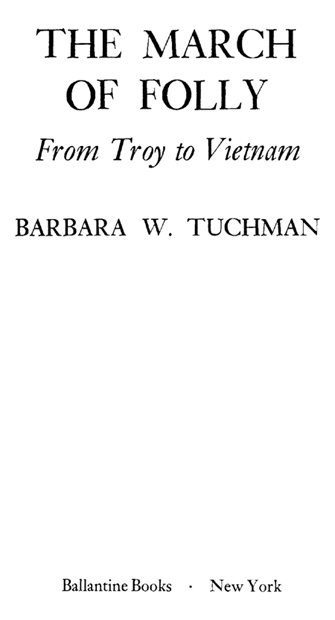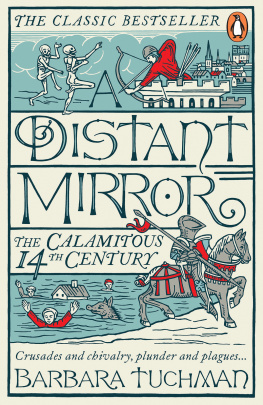Barbara W. Tuchman - The March of Folly: From Troy to Vietnam
Here you can read online Barbara W. Tuchman - The March of Folly: From Troy to Vietnam full text of the book (entire story) in english for free. Download pdf and epub, get meaning, cover and reviews about this ebook. year: 2011, publisher: Ballantine Books, genre: History. Description of the work, (preface) as well as reviews are available. Best literature library LitArk.com created for fans of good reading and offers a wide selection of genres:
Romance novel
Science fiction
Adventure
Detective
Science
History
Home and family
Prose
Art
Politics
Computer
Non-fiction
Religion
Business
Children
Humor
Choose a favorite category and find really read worthwhile books. Enjoy immersion in the world of imagination, feel the emotions of the characters or learn something new for yourself, make an fascinating discovery.

- Book:The March of Folly: From Troy to Vietnam
- Author:
- Publisher:Ballantine Books
- Genre:
- Year:2011
- Rating:5 / 5
- Favourites:Add to favourites
- Your mark:
- 100
- 1
- 2
- 3
- 4
- 5
The March of Folly: From Troy to Vietnam: summary, description and annotation
We offer to read an annotation, description, summary or preface (depends on what the author of the book "The March of Folly: From Troy to Vietnam" wrote himself). If you haven't found the necessary information about the book — write in the comments, we will try to find it.
Barbara W. Tuchman: author's other books
Who wrote The March of Folly: From Troy to Vietnam? Find out the surname, the name of the author of the book and a list of all author's works by series.
The March of Folly: From Troy to Vietnam — read online for free the complete book (whole text) full work
Below is the text of the book, divided by pages. System saving the place of the last page read, allows you to conveniently read the book "The March of Folly: From Troy to Vietnam" online for free, without having to search again every time where you left off. Put a bookmark, and you can go to the page where you finished reading at any time.
Font size:
Interval:
Bookmark:

In The March of Folly, Barbara Tuchman, as usual, breaks all the rules. She sails forth with bold moral purpose at a time when most other popular historians hug the shores of biography and most academic historians are content to paddle quietly in small ponds. Tuchmans special talent, as her fellow journalist and historian Frances Fitzgerald has written, lies in her ability to wade through mountains of documentation and come out with Ariadnes threadthe clean story line that permits her readers to follow her through a maze of events into the life of a period. There is more to Tuchmans appeal than superb storytelling. She also glories in unmasking deceit, cant, and pomposity.
Newsweek
The specter of this ultimate folly [nuclear war] hangs over Barbara Tuchmans brilliant and troubling book, The March of Folly, like a ghost from the future. She addresses it not a word. She doesnt have to. No one could read her accounts of the powerful of this world without thinking of the solemn warnings since 1945 that we are building weapons of our own destruction. For Tuchman this is the essence of folly: disaster plainly foreseen by many in good time, ready and feasible alternatives, willfully ignored by men obsessed with power.
Chicago Tribune
The March of Folly is, at one level, a glittering narrative of three major events. At another, it is a moral essay on the crimes and follies of governments and the misfortunes the governed suffered in consequence.
The New York Times Book Review
The specter of this ultimate folly [nuclear war] hangs over Barbara Tuchmans brilliant and troubling book, The March of Folly, like a ghost from the future. She addresses to it not a word. She doesnt have to. No one could read her accounts of the powerful of this worldcorrupt Renaissance popes, the arrogant ministers of King George III of Britain who lost America, the confident Cold War mandarins of Washington without thinking of the solemn warnings since 1945 that we are building the weapons of our own destruction. For Tuchman this is the essence of folly: disaster plainly foreseen by many in good time, ready and feasible alternatives, willfully ignored by men obsessed with power.
Chicago Tribune
The March of Folly is, at one level, a glittering narrative of three major events. At another, it is a moral essay on the crimes and follies of governments and the misfortunes the governed suffer in consequence.
The New York Times Book Review
Only one living writer of history has gained and held anything like such a general readership. Barbara Tuchmans new book shows us why. She now sweeps us through thirty centuries, from the fall of Troy to the war in Vietnam, paying close attention along the way to how the Renaissance popes provoked the Reformation and England lost the American coloniesthe four events shes found to propel her idea that the disasters of history are the result of the folly of rulers. But even these thumping good stories are not quite enough for her. We are also asked to think of Montezuma, of the Visigoths in Spain, of Louis XIV and the Huguenots, of the Kaisers use of submarine warfare, of the Japanese attack on Pearl Harbor: folly upon absorbing folly.
Vogue
Like her past books, her new one is witty, intelligent and elegant. Tuchman without question is the most skilled popular historian in practice.
The New Milford Times
By Barbara W. Tuchman
BIBLE AND SWORD (1956)
THE ZIMMERMANN TELEGRAM (1958)
THE GUNS OF AUGUST (1962)
THE PROUD TOWER (1966)
STIL WELL AND THE AMERICAN EXPERIENCE IN CHINA (1971)
NOTES FROM CHINA (1972)
A DISTANT MIRROR (1978)
PRACTICING HISTORY (1981)
THE MARCH OF FOLLY (1984)
THE FIRST SALUTE (1988)

A Ballantine Book
Published by The Random House Publishing Group
Copyright 1984 by Barbara W. Tuchman
All rights reserved.
Published in the United States by Ballantine Books, an imprint of
The Random House Publishing Group, a division of Random
House, Inc., New York, and simultaneously in Canada by Random
House of Canada Limited, Toronto.
Grateful acknowledgment is made to The University of
Chicago Press for permission to reprint an excerpt from
The Iliad, translated by Richmond Lattimore. Copyright 1951 by
the University of Chicago. All rights reserved.
Used by permission.
Ballantine and colophon are registered trademarks of
Random House, Inc.
www.ballantinebooks.com
Library of Congress Catalog Card Number: 84-45672
eISBN: 978-0-307-79856-5
This edition by arrangement with
Alfred A. Knopf, Inc., New York.
v3.1
And I can see no reason why anyone should suppose that in the future the same motifs already heard will not be sounding still put to use by reasonable men to reasonable ends, or by madmen to nonsense and disaster.
J OSEPH C AMPBELL
Foreword to The Masks of God: Primitive Mythology, 1969
Source references will be found in the notes at the end of the book, located by page number and an identifying phrase from the text.
THE TROJANS TAKE THE WOODEN HORSE WITHIN THEIR WALLS
. Amphora showing the Wooden Horse, 670 B.C . (Mykonos Museum, Deutsches Archologisches Institut, Athens)
. Wall painting from Pompeii, c. 1st century B.C . (Museo Nazionale, Naples; Photo: Fogg Art Museum)
. Bas-relief depicting an Assyrian siege engine, 884860 B.C . (British Museum)
. Laocoon, Roman, C.A.D . 50 (Museo Pio-Clementino, Belvedere, Vatican)
THE RENAISSANCE POPES PROVOKE THE PROTESTANT SECESSION: 14701530
. Sixtus IV, by Melozzo da Forli (Vatican Museum; Photo: Scala)
. Innocent VIII, by Antonio del Pollaiuolo (St. Peters; Photo: Scala)
. Alexander VI, by Pinturicchio (Vatican; Photo: Scala)
. The Mass of Bolsena, showing Julius II, by Raphael (Vatican; Photo: Scala)
. Leo X, by Raphael (Uffizi, Florence; Photo: Scala)
. Clement VII, by Sebastiano del Piombo (Museo di Capodimonte, Naples; Photo: Scala)
. The Battle of Pavia, Brussels tapestry (Museo di Capodimonte, Naples; Photo: Scala)
. The traffic of indulgences, by Hans Holbein the Younger (Metropolitan Museum of Art, Dick Fund 1936)
. Lutheran satire on papal reform (American Heritage)
THE BRITISH LOSE AMERICA
. The House of Commons during the reign of George III, by Karl Anton Hickel (National Portrait Gallery)
. William Pitt, 1st Earl of Chatham, by Richard Brompton (National Portrait Gallery)
. George III, from the studio of Allan Ramsay (National Portrait Gallery)
. Charles Townshend, British School, painter unknown (Collection of the Duke of Buccleuch and Queensberry, K.T., Drumlanrig Castle, Dumfriesshire; Photo: Tom Scott)
. Augustus Henry Fitzroy, 3rd Duke of Grafton, by Pompeo Batoni (British Museum)
. Edmund Burke, from the studio of Sir Joshua Reynolds (National Portrait Gallery)
. Charles Watson-Wentworth, 2nd Marquess of Rockingham, from the studio of Sir Joshua Reynolds (
Font size:
Interval:
Bookmark:
Similar books «The March of Folly: From Troy to Vietnam»
Look at similar books to The March of Folly: From Troy to Vietnam. We have selected literature similar in name and meaning in the hope of providing readers with more options to find new, interesting, not yet read works.
Discussion, reviews of the book The March of Folly: From Troy to Vietnam and just readers' own opinions. Leave your comments, write what you think about the work, its meaning or the main characters. Specify what exactly you liked and what you didn't like, and why you think so.




